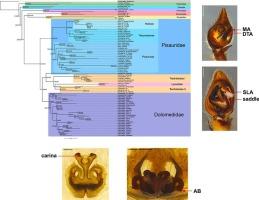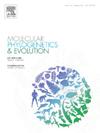Molecular phylogenetics of nursery web spiders (Araneae: Pisauridae)
IF 3.6
1区 生物学
Q2 BIOCHEMISTRY & MOLECULAR BIOLOGY
引用次数: 0
Abstract
Pisauridae Simon, 1890, or nursery web spiders, are a large family with a worldwide distribution and very diverse life history strategies. Despite being named for their nursery webs, similar structures are built by some members of Ctenidae, Trechaleidae, and Oxyopidae. Pisauridae has no known morphological synapomorphies that circumscribe all members of the family, and delineation of subfamilies has been a longstanding issue. In addition, several recent molecular phylogenetic studies have called into question the monophyly of Pisauridae. Here, we infer a phylogeny of Pisauridae with nine genetic markers (12S, 16S, 18S, 28S, actin, COI, histone H3, ITS2, and NADH) combined with ultraconserved elements (UCEs) to test the monophyly of the group and determine intrafamilial relationships. Our study includes a total of 81 terminals (59 of them pisaurids). Our maximum likelihood and gene coalescence analyses strongly suggest that as currently circumscribed, the family Pisauridae is not monophyletic. To circumscribe Pisauridae as a monophyletic group, based on our molecular results, we propose the restoration of the family Dolomedidae Simon, 1876 (rank resurrected) to include the genera Dolomedes Latreille, 1804 and Bradystichus Simon, 1884. In addition, based on morphological evidence, we also place in Dolomedidae the genera Megadolomedes Davies & Raven, 1980; Tasmomedes Raven, 2018; Mangromedes Raven, 2018; Ornodolomedes Raven & Hebron, 2018; and Caledomedes Raven & Hebron, 2018. We provide a phylogenetic delimitation of the three subfamilies of Pisauridae: Halinae, Thaumasiinae, and Pisaurinae. Ten pisaurid genera are deemed incertae sedis in terms of their placement. In light of our hypothesized molecular phylogeny, we discuss the morphological characters and putative synapomorphies of Pisauridae and propose diagnostic characters for its subfamilies and for the family Dolomedidae, along with taxonomic notes about genera not included in our study.

育儿网蜘蛛(Araneae: Pisauridae)的分子系统学。
育儿网蜘蛛(Pisauridae Simon,1890 年)是一个庞大的家族,分布于世界各地,生活史策略多种多样。尽管因其育儿网而得名,但栉蛛科(Ctenidae)、蛛蛛科(Trechaleidae)和蛛蛛科(Oxyopidae)的成员也有类似的结构。栉水母科(Pisauridae)没有已知的形态同形异构体来限定该科的所有成员,因此亚科的划分一直是一个长期的问题。此外,最近的几项分子系统发育研究也对鱼龙科的单系性提出了质疑。在此,我们利用 9 个遗传标记(12S、16S、18S、28S、肌动蛋白、COI、组蛋白 H3、ITS2 和 NADH)结合超保守元素(UCE)推断了鱼龙科的系统发育,以检验鱼龙科的单系性并确定科内关系。我们的研究共包括 81 个终端(其中 59 个是比索类)。我们的最大似然法和基因凝聚分析强烈表明,按照目前的划分,雉科并非单系。基于我们的分子研究结果,我们建议恢复 Dolomedidae Simon, 1876 科(等级复活),以包括 Dolomedes Latreille, 1804 属和 Bradystichus Simon, 1884 属,从而将 Pisauridae 定义为单系群。此外,根据形态学证据,我们还将 Megadolomedes 属 Davies & Raven, 1980 年;Tasmomedes 属 Raven, 2018 年;Mangromedes 属 Raven, 2018 年;Ornodolomedes 属 Raven & Hebron, 2018 年;以及 Caledomedes 属 Raven & Hebron, 2018 年归入 Dolomedidae。我们提供了雉龙科三个亚科的系统发育划分:Halinae、Thaumasiinae 和 Pisaurinae。有 10 个鱼龙亚科属的位置被认为是不确定的。根据我们假定的分子系统发育,我们讨论了鱼龙亚科的形态特征和假定的同形异构体,并提出了鱼龙亚科和鱼龙科的诊断特征,以及未包括在我们研究中的属的分类说明。
本文章由计算机程序翻译,如有差异,请以英文原文为准。
求助全文
约1分钟内获得全文
求助全文
来源期刊
CiteScore
7.50
自引率
7.30%
发文量
249
审稿时长
7.5 months
期刊介绍:
Molecular Phylogenetics and Evolution is dedicated to bringing Darwin''s dream within grasp - to "have fairly true genealogical trees of each great kingdom of Nature." The journal provides a forum for molecular studies that advance our understanding of phylogeny and evolution, further the development of phylogenetically more accurate taxonomic classifications, and ultimately bring a unified classification for all the ramifying lines of life. Phylogeographic studies will be considered for publication if they offer EXCEPTIONAL theoretical or empirical advances.

 求助内容:
求助内容: 应助结果提醒方式:
应助结果提醒方式:


